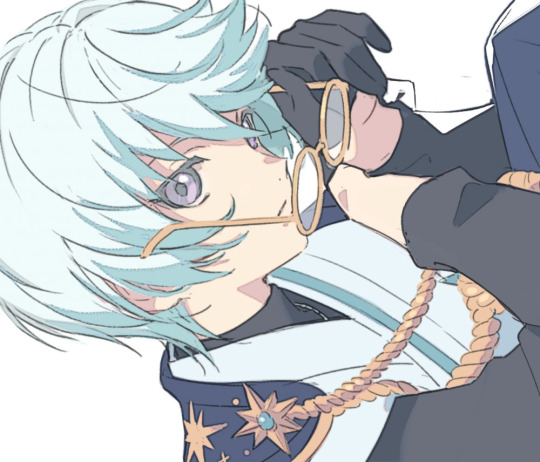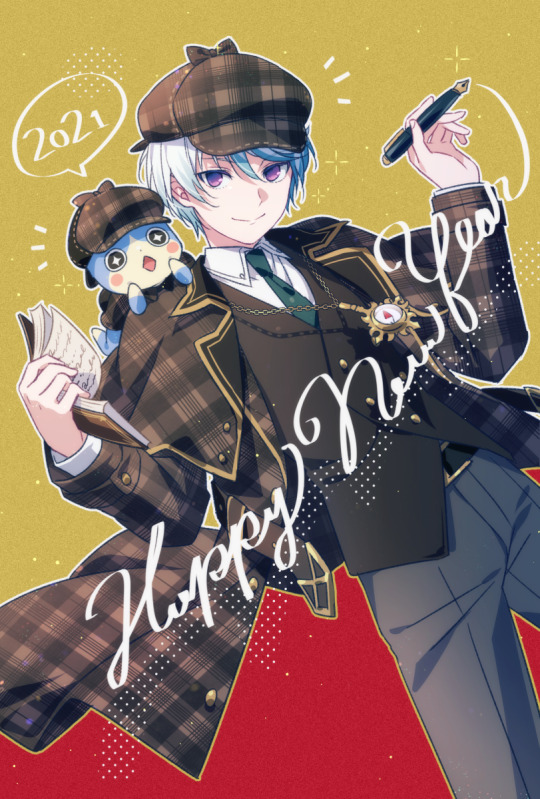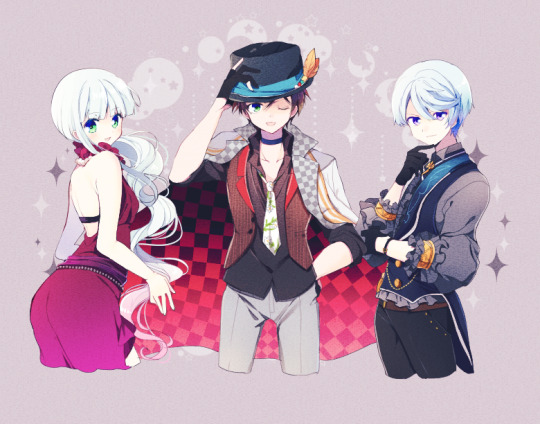#ミクリオ
Text


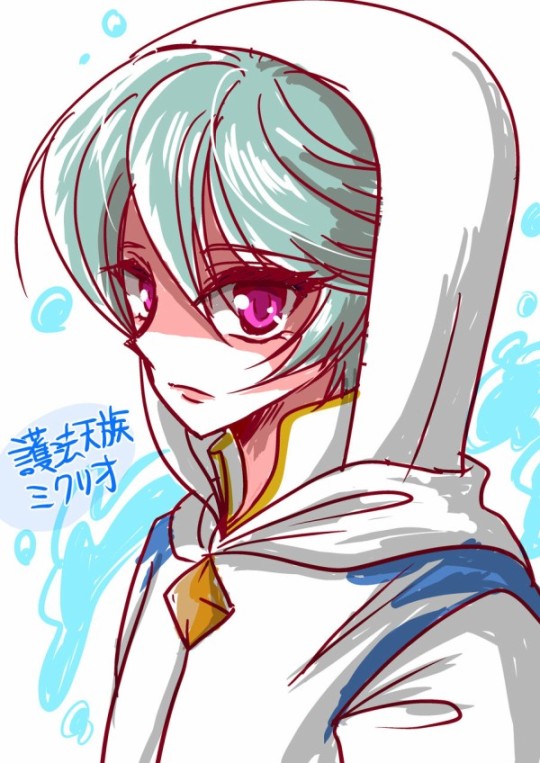
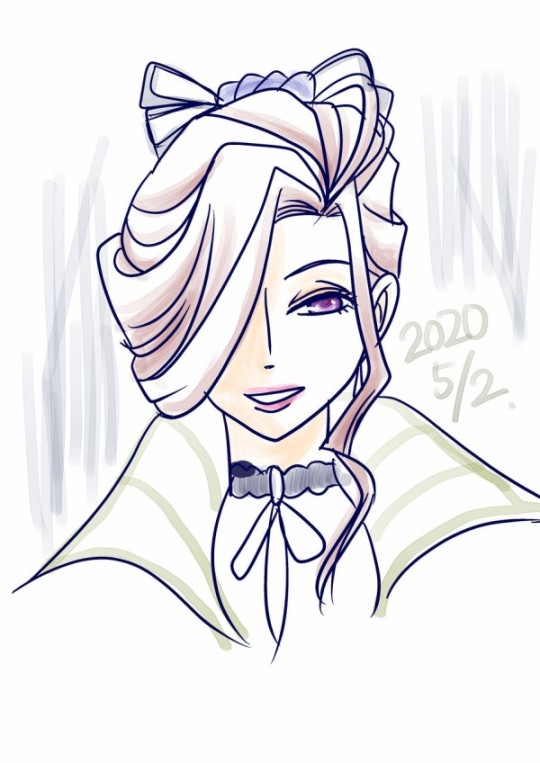
#テイルズオブ#テイルズオブゼスティリア#TOZ#mikleo#edna (toz)#Edna#マルトラン#エドナ#ミクリオ#my art#fanart#tales of zestiria#Zestiria
4 notes
·
View notes
Text
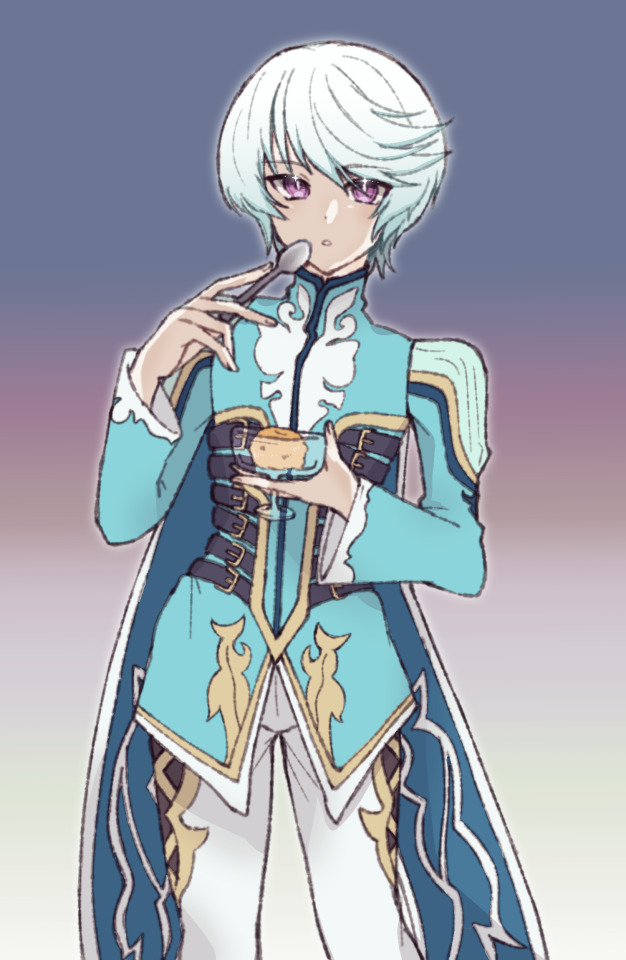
最近ゼスティリアを始めたのでミクリオを初描き
84 notes
·
View notes
Text
Sorey, the Vigil-Keeper


I know there’s a popular theory that Sorey might be reborn as a seraph at the ending, but to this, I would like to propose an alternative that is not less convincing, with hints spread throughout both Zestiria and Berseria.
スレイ「……オレ、メーヴィンに教えて貰ったこと絶対忘れない。ずっと伝えていく!」
メーヴィン「……ふ。俺が看取られるなんて……考えた事も……なかった」
In this dialogue from the screenshots above, I want you to pay attention to the word “看取る” and its variations, as it is a word that keeps coming up in the story.
If you look up in dictionaries, you would find that the Japanese word “看取る” means “to attend someone’s deathbed; to care for someone who is close to death until their death.” It is, admittedly, a word that is hard to translate to English.
Here’s how the official English translation goes about, emphasis mine, to bring attention to how it’s localized:
SOREY: I promise... I'll never forget what you've told me, Mayvin. And I'll teach it to others as well!
MAYVIN: Heh. Never did I imagine I would die with others... By my... Side...
But I think the word has significance in Zestiria lore, with Mayvin, being one himself, didn’t expect to have someone to watch over him as he died.
And how do I know that? It’s in the name, as explained in the sidequest revolving the poet Mayvin.

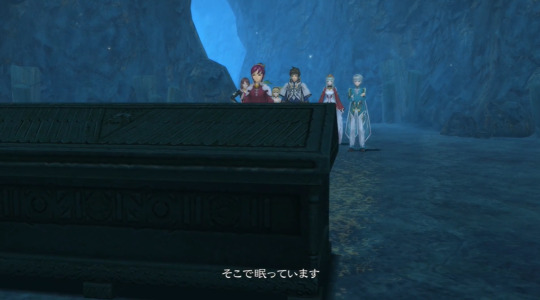
Here’s a bit of the dialogue as a refresher, with omissions here and there:
アカシャ「語り部は個の名を持たない一族。『メーヴィン』とは一族が代々受け継ぐ名なのです」
ミクリオ「つまり、詩人は何代前のメーヴィンか!」
ザビーダ「メーヴィン……『看取る者』って意味だっけか?」
アカシャ「彼らは、その名と共に契約を受け継ぎ、世界を傍観する宿命を負うのです」
ミクリオ「しかし、なぜそんな宿命を?」
ザビーダ「初代がなんかやらかしちまって、強制的に誓約が与えられた……とかなんとかだっけ?」
スレイ「応えなきゃな。メーヴィンが託してくれた想いに」
Here is how it goes in the official English localization (emphasis, again, mine):
AKSHA: Those in the clan of Storytellers have no names of their own. The name “Mayvin” is passed down through the generations.
MIKLEO: So the poet Mayvin was his ancestor from centuries ago!
ZAVEID: Doesn’t “Mayvin” mean “Caregiver” in the old tongue?
AKSHA: Those born into that name and that oath must accept their fate to be observers of the world.
MIKLEO: But I wonder... why is that their fate?
ZAVEID: Wasn’t it, like, the first one did some damn fool thing and wound up forced to take the oath as punishment or something?
SOREY: We need to work hard to live up to the hopes that Mayvin placed in us.
But if I were to translate it myself more closely to the original Japanese, it would be more like this:
AKSHA: Those in the clan of Storytellers have no names of their own. The name “Mayvin” is passed down through the generations.
MIKLEO: So the poet Mayvin was from several generations ago!
ZAVEID: Doesn’t “Mayvin” mean “Vigil-Keeper” in the old tongue?
AKSHA: Those inheriting that name and that oath must accept their fate to be observers of the world.
MIKLEO: But I wonder... why is that their fate?
ZAVEID: Wasn’t it, like, the first one did some damn fool thing and wound up forced to take the oath as punishment or something?
SOREY: We need to work hard to live up to the hopes that Mayvin placed in us.
What am I implying here? I think that the Storytellers of Time, as a clan, don’t have to be related by blood. The wording used here to me implies that the name is inherited, passed down. (Fits nicely with Zestiria’s theme that “Legend will someday become hope.” Legends or “伝承” are things that get passed down. That get inherited. That outlives its keepers, because it is the hope or will that will not die as long as there’s someone out there to accept it.)
It’s a name that means 看取る者, the one who attends someone on their deathbed. As for why I translated this as “Vigil-Keeper”, I will bring it up later.
(As a sidenote: Sorey gets his alternative costume from this sidequest. Makes you think.)
But first. Let’s talk about Mayvin more. After all, there’s also “Mayvin” in Berseria.


マギルゥ「メルキオル・メーヴィン、火山で待っておれ」
マギルゥ「案ずるな。お主の最期は儂が”看取る”」
MAGILOU: Melchior Mayvin, I’ll see you at the volcano.
MAGILOU: Don’t you worry. I’ll be sure to be there as you breathe your last.
Hard, isn’t it, to get this point across in English? But they actually put the word in the quotes as ”看取る” as if trying to get your focus on that word. Part of why I think the name “Mayvin” (along with the oath that comes with it) gets inherited as you watch someone die before your eyes, and take on their name.
Now back to Zestiria. Sorey actually has a title series that corresponds to the turning points of his character development, namely:
Lad of Separation (別離の若者) (Bronze): Obtained when he left Elysia, as he learned the lesson of farewells.
Reunited Traveler (旅は道連れ) (Silver): Obtained when Rose joined the party, as he learned to be with a human companion that can understand him as a fellow human.
Vigil-Keeper (看取りし人) (Gold): Obtained as he watched Mayvin die in his arms. I will explain more on this below.

看取りし人
消えゆく命を見届け、その想いを胸に刻んだ者に託された称号。
Vigil-Keeper
A title entrusted to one who sees off passing lives, and engraves the wishes of the fallen upon his heart.
(By the way, it’s also part of a series of titles belonging to the seraphim too.)
Yes, it’s the same word/characters you see in all of the previous ones shown above. He actually obtained a title that is basically the ancient tongue meaning for “Mayvin.”
刻遺の語り部
「メーヴィン」という名を代々受け継ぐ人間の一族がいる。彼らは「刻遺の語り部」と呼ばれる存在で、「人間・天族・導師・憑魔などの歴史に干渉しない」という誓約により、非常な長命を得ている。「刻(とき)に遺される」という名からわかるように、人間では考えられないような時間を生きながら、人や天族が織りなす歴史を語り、後世に残すことを使命としている。これは初代メーヴィンに対して課せられた、一種の義務や罰ではないか、という説が伝わっている。歴史に干渉しないためその存在を知る者は少なく、天族のあいだでも語ることは禁忌とされているようだ。
Storytellers of Time
There is a human clan which inherits the name “Mayvin” from generation to generation. They are known as the “Storytellers of Time” and have a very long life due to their oath not to interfere with the history of humans, seraphim, Shepherds, and hellions. As implied from the name “abandoned in time,” they have the duty to tell the history as woven by humans and seraphim while living for a long time unimaginable for humans, preserving for the future generations, left behind by the world and time. It has been theorized that this may have been some kind of obligation or punishment imposed on the first Mayvin. Since they do not interfere with history, few humans know of their existence, and it has become something of a taboo to talk about, even among the seraphim.
As a note, the “Time” part of the title is “刻遺” and I believe I had already talked about the word “time” being written as “刻” before. It also implies “abandoned in time” (“刻に遺される”).

ミクリオ「マオテラスと繋がり、刻にとり残され、何年……いや、何百年待つのか……」
MIKLEO: By bonding with Maotelus, you’ll be abandoned in time. It could take years… It could take centuries.
Interesting wording, is it not?
By the way, another interesting but easy-to-miss detail:
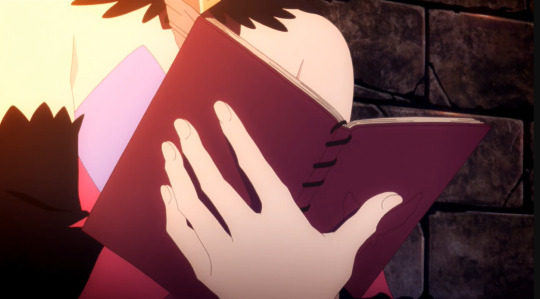
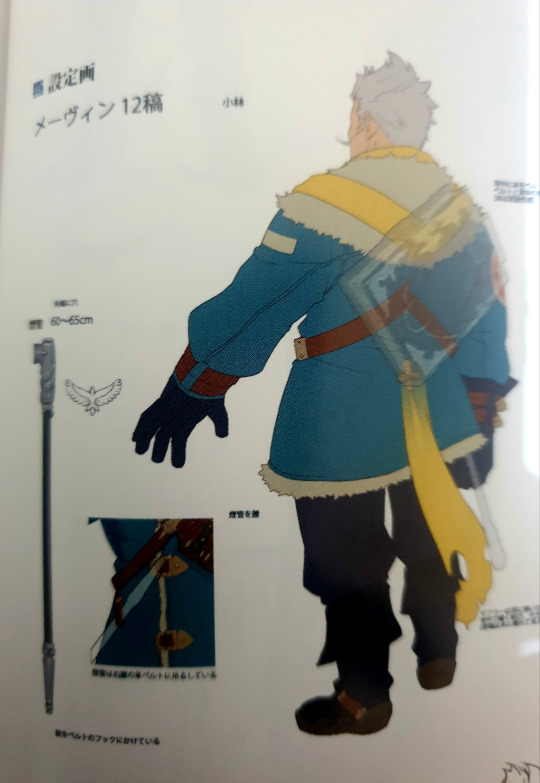
If you squint closely, both Magilou and Zestiria!Mayvin have bird motifs (on her notebook for Magilou, where presumably she wrote the stories to tell to the next generations, and on both his pipe and book for Z!Mayvin). You know who else has bird motifs?

空に飛び立って
幼い頃からいつも身に着けている羽の耳飾り。穢れを知らない鳥は故郷を飛び立ち広い世界を目指す。
Flying into the sky
A feather earring that he has always worn since he was a child. The bird, knowing nothing of malevolence, takes a flight off from its homeland to the vast world.
(I mean, a lot of Zestiria and Berseria characters have bird motifs, but hey. And I will someday talk about this too, but we’ll save this for the future.)
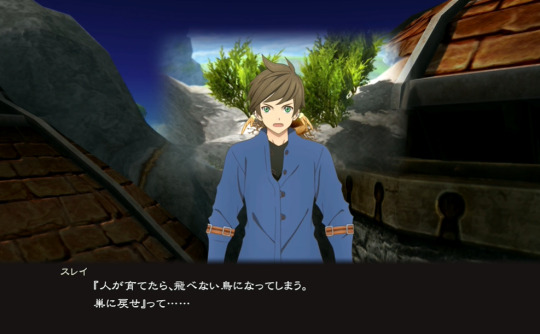
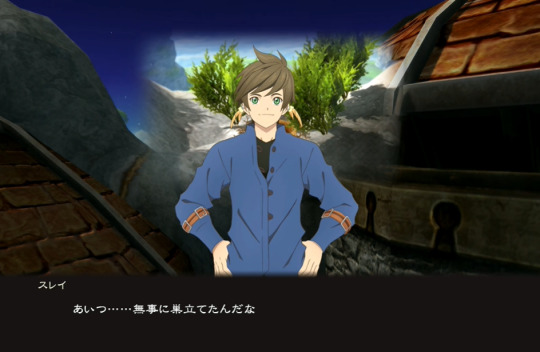
スレイ「『人が育てたら、飛べない鳥になってしまう。巣に戻せ』って……」
スレイ「あいつ……無事に巣立てたんだな」
SOREY: “A kept bird will never learn to fly,” he said. “Put it back.”
SOREY: Guess you made it out of the nest on your own, huh?
And I love it. I love this because at its core, Zestiria is about humans and seraphim, and Sorey and Mikleo are intended by the creators to symbolize that. Being a storyteller and explorer fits him as his defining character trait is that he is passionate about history, passionate about finding ways on how to unite humans and seraphim. Sure, he was still the Shepherd up until before he brought out that second strike to Heldalf, and ended his suffering of Eternal Solitude, but right after that? Right after all this is done? I’m inclined to believe he might take the oath, take the name “Mayvin” after the one human he learned from the most.
But I don’t think he is going to see it as a burden, an obligation, a punishment... after all, the essence of adventure lies in exploration, in the words of Mayvin, the Explorer.
And, in the words of Mayvin, the Storyteller, you can’t fathom the true meaning of legends until you’ve seen their history with your own eyes...
(He might not be able to interfere with the world history after this, sure, but in a way, that also frees him from the shackles that used to bind him as the Shepherd. He had done what he needed to. Now is the time to entrust it to the next generations.)
ところで『探検家』であるために一番大切なことはなんだと思う?
好奇心や勇気も重要だが、一番じゃないな
答えは『探検から無事に帰ること』だ
By the way, what would you say is the most important quality of an explorer?
Curiosity and courage are definitely key, but they are not the most vital.
The answer is the wherewithal to come back from your exploration safely.
And he did come home safely. At the end.
#tales of#tales of zestiria#mino rambles#as a warning: wall of text#and even more importantly#a lot of pics lol#btw i still think both interpretations are valid re: sorey in the ending#it's why they left it vague too i think#yamamoto: we'll leave what happens after the ending to players' imagination after all#mino talks zesty
57 notes
·
View notes
Text
so apparently muse is blind in the scene where she meets mikleo and the party? (muse's entry in the toz perfect guide glossary)
先代導師ミケルの妹で、ミクリオの母親。強い霊応力を持つ女性。十数年前の戦災において、マオテラスが生んだ穢れがイズチにまで流れるのを食い止めるために、誓約を用いて自ら人柱になった。その際代償として視力を喪失する。天族に転生したミクリオをゼンライに託したのち、十数年に渡って封印の人柱として存在し続けていた。
21 notes
·
View notes
Text
ゼスティリアザクロスを改めて観てゼスティリアとの違いとか、未来とか、こぼれ話つらつら
『浄化とは 導師が穢れを受け止める事』という設定になった事により、スレイさんがしっかり人間の色んなものが渦巻く感情を受け止めるようになる。『人間』を知らなかったスレイが『人間』を学んでいく事で、その先にある穢れシステムの真実に自力で近づけた。
持ち前の真っ直ぐさで、導師である事を受け入れつつも、導師というシステムになるのではなく『みんなが共存できる世界』をちゃんと自分の夢に出来ているので言動も変わり説得力が高まったと思われる。
世界を見て、自分でしっかり考え、夢の中で災禍の顕主ベルベットに発破をかけられた結果、「穢れがあるから強くなれるのが人間だ」と答えを叩きつけ、ベルベットと同じように世界のために眠りにつく選択をした。でもそれは導師としてじゃなく、自分の夢のために。ヘルダルフが散々殺せっつってんのに聞かないあたりは流石スレイって感じだけど、そこがスレイの本質的に揺るがせてはいけなかったはずの部分だし、単純に人の良いところが出てるし結果ヘルダルフもウキウキで第2の人生始めたしええんち��うかな。
この世界には人間という穢れ(憑魔、あるいは業魔)も天族という浄化も必要って、大きく解釈すると実はベルベットと似たようなこと言ってるんだよね。導師だって災禍だって自分らしく生きていければそれでいいのさ。
人は誰しも穢れを生む。ただ許容量が人によって違うだけ。ロゼは許容量がクソデカかっただけで(きっとスレイもアホほどデカい。アリーシャが殺されかかった時マジギレだったし穢れる要素はいくらでもある)、やはり暗い感情を持ち合わせていた。自分の行いは必ずしも正しくないと気付いていたけど、スレイに出会って面と向かってそこを認識してしまった事で動揺したし、たぶん初めて誰にも見せたことのない類の感情が爆発したんだと思う。ゲームでも泣きはしたけど終始明るかったロゼが、馬を駆りながら慟哭するシーンはとても人間らしくなれていた。
一番ゼスクロ通して成長したのがアリーシャだと思う。出自から変更されてるので変わって当然なんだけど、夢を追うということ、大切な人や国を守ること、穢れという人の強さ弱さ業や悲哀に立ち向かう勇気。ラストはとても0話1話で竜巻や虫にビクビクしてた女の子と同一人物は思えなくなってた。スレイと同じく自分で考えて、「私はこう思ってて、こうしたいから、私にこうさせてほしい、する」と力強く伝える事ができるようになっていたのが、ゲームとの1番の違いだと思う。
ゼスクロではマオテラスが直接誓約でライラに浄化の力を与えていた。
何故ライラを選んだのかは語られなかったけど、ベルベットとある意味自分の故郷であるアバル付近にあった祠か、プルナハ湖は意図的に関係させていると思う。
ゲームでは天族が生まれる時、少なくとも人間からの転生だった場合死んだ時そのままの��で生まれる設定だけど、そうなるとセリカの転生だった場合間に挟まってるのシアリーズはどうなるのか。ベルベットに近い存在だった場合は。マオテラスがライラを選んだ時点では既に湖の乙女と呼ばれていたので、住み着いてはいたんだろうけど。
あとついでにエドナちゃんもアイゼンの話しぶりだとかなり幼年から面倒見てるっぽいから、仮に転生出身だったら早めに亡くなっちゃったのかな。
あと護法天族がほぼほぼ歴代導師の転生なので、やはりスレイも天族に転生しそう。
短い時間を共にしておやすみして、長い時間待って、帰ってきたと思ったらまた短い時間でさよならしちゃうミクリオの事を考えたら、泣けてきちゃうからどうか転生してくれ。
穢れが落ち着いた事で自我を取り戻したアイゼン。
結構ドラゴン状態をエンジョイしてそう。自分から積極的に微ドラゴン化して戦ってたくらいだしエドナが囚われてないんだったらまぁ嫌いじゃないでしょうね。男のロマンとか言ってそう。
遠い未来で穢れがより少なくなったら自然と元の姿に戻るのかもしれないけど、もしかしたら本人はこのままでもいいやとか下手したら思ってそうだし、エドナちゃんも「人を襲ったりしないならいいや」ってなってそう。
もしくは五大神に欠けができた時に代替わりを買って出るかもれない。地の聖主アイゼンって呼び名、かっこいいだろう?とか言いかねん。
マオテラスも「僕が羅針盤持ってるんだからちゃんと言うこと聞いてよね!」ってにこにこしてたらかわいい。
ところでゲームのペンドラゴの教会神殿で白い子供の幽霊が出た事があるって言ってる人いるけど、実はライフィセットの姿に戻ろうと思えば戻れなくもないのかも(幽霊の話について特に何もサブイベとかチャットもその後のフォローもないのが一周まわって不自然)
最後の「これが世界」
新しい建物とかが増えてて時間経過を表現してるんだろうけど、すごく特徴のある建築物がチラホラ見受けられるからもしかしたらもしかすると続編の構想があるにはあったのかも。やるかはさておき……アライズどうなるんかな(ベルセリアで謎に言及されてる異大陸の存在、炎の聖剣。ジークフリートという男。アルフェンが炎の剣を使ってる。銃を使うシオン)(こじつけすぎな気もするけど)
ミケルが残した天遺見聞録にはベルセリアの時代は1000年前と書かれていたけど、メーヴィン(マギルゥ)がローランスに伝えた記録だと言ってローランス皇帝がスレイに伝えたのは「数千年前」になってる。
マギルゥだったらあえて後世の人間を弄びたいがためだけにテキトーに伝えることもありそうだけど、「誓約を破って」伝えた内容でそんな事する?マギルゥの誓約の効果は長寿なので何かがあって死にたくなったとか、死ななきゃいけなくなったはあるかもだけど、あのマギルゥが誓約を破ろうと思えるまでの事は何だったのか。
そして年数の矛盾に関しては、これは単純に台本のミスか、ローランスで口伝される内に間違って伝わってしまったか、皇帝が言い間違えちゃったのをスレイさんがほぁ〜って聞き流してたかかな。
見終わって色々読んだりして気づいたけど、ゼスクロ、本編でスレイさんの風神依してない。OPではめちゃくちゃ動くのに……
0 notes
Photo
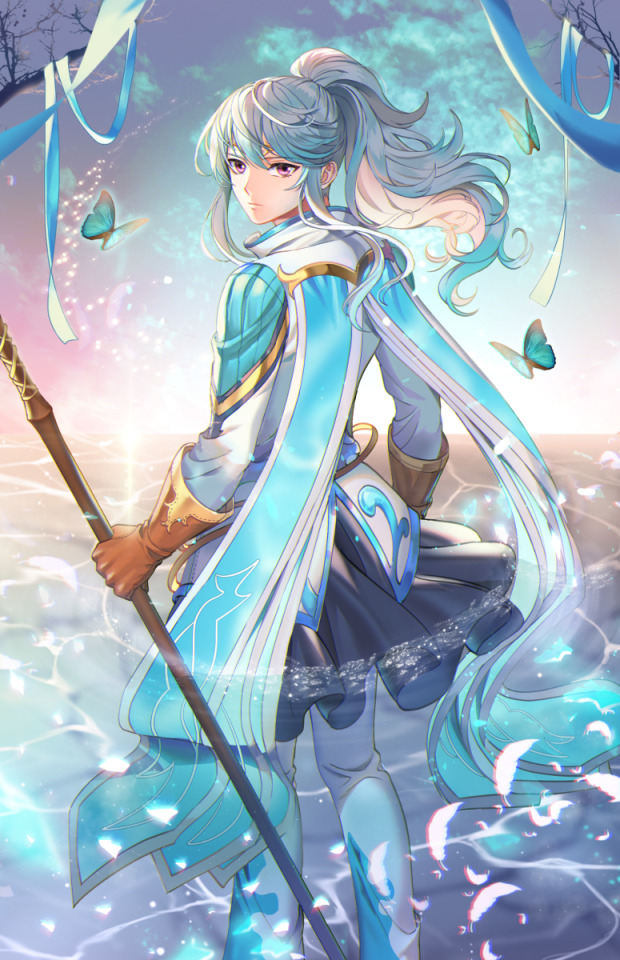
Mikleo
366 notes
·
View notes
Text
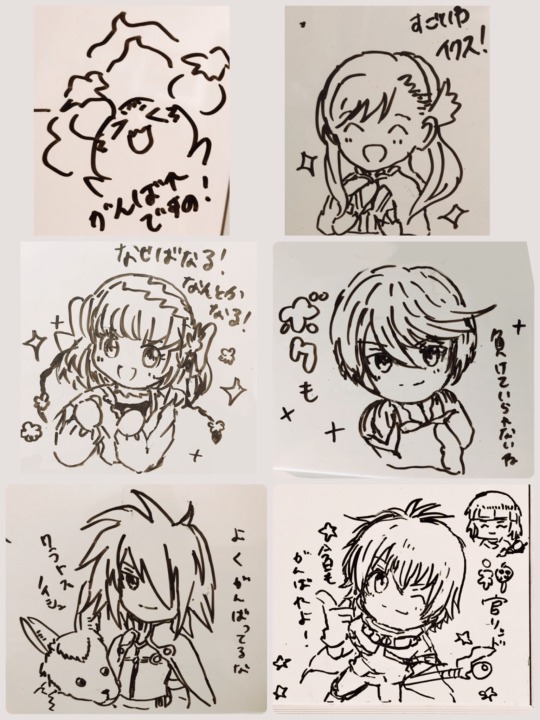
テイルズキャラクターが1日1回応援してくれる(?)シリーズ
#テイルズ#tales#tales of rays#tales of eternia#tales of symphonia#tales of xillia#tales of zesteria the x#tales of the abyss#ミクリオ#クラトス#ミリーナ#ミュウ#レイア#リッド
29 notes
·
View notes
Photo

Lio Fotia and Mikleo.
Fire and Water.
209 notes
·
View notes
Text
Water Armatus, Bow and Arrow

I’ve always thought that it is interesting that the Water Armatus wields bow and arrow, especially since it holds many significances in the Japanese culture that Zestiria draws many inspirations from. I believe it’s a deliberate choice that the Divine Artifact needed for Water Armatus is a bow too, so I will try to elaborate more on this, since the many meanings for it might not be apparent to people who aren’t familiar with it.
Remember: Symbols can have more than just one meaning.
First off, and I know we start with the ending part here, but since it’s actually stated in the novel, I will talk about how Mikleo offers to go first, as the whistling arrow (嚆矢). Our first symbolism, but far from the last, for the Water Armatus.
「スレイ、最初に僕を撃ち出せ」
「ミクリオ……!」
息を飲むスレイをミクリオは決意に満ちた瞳で見つめる。
最初に撃ち出す仲間を迷うであろうスレイの気持ちをくみ取った提案だった。
「この旅の終わり、僕が嚆矢となる」
僕たちの決意と覚悟を最初に撃て。
“Sorey, shoot me out first.”
“Mikleo...!”
Mikleo looks at Sorey, who gulped, intently with eyes full of his determination. It was a suggestion that took into consideration the feelings of Sorey, who had been hesitating about which friend he would shoot out first.
“At this journey’s end, I will become the whistling arrow.”
Shoot our determination and resolve first.
The whistling arrow (嚆矢) often symbolizes “dawn” or “beginning”, since it’s used to signal the beginning of battle. Particularly, around the time of Heian period, an arrow with a whistle (kabura, 鏑) attached (so often known as kabura-ya, 鏑矢 as well) would be shot, not only to alert the enemy, but also to ward off evil spirits and alert friendly kami to lend their support through its whistling sound. Befitting for the seraph whose Divine Artifact is a bow, since he does this to reassure Sorey, as well as to ask for support for him from the friendly kami—other seraphim that will come after him. Mikleo is also the one seraph who has been with Sorey since the beginning too, even before Sorey became the Shepherd. Since the dawn of the Shepherd (導師の夜明け).
(An arrow that flies straight and steadfast signifies no hesitation for its resolve.)

But bows and arrows mean so much more than this, so I would like to take a look at other meanings too, as well as going earlier than straight-up the final battle. The first obvious thing that stood out to me is that in Japanese, bow and arrow (弓矢, yumiya) is often a symbol for the battlefield, since 戦 (read as ikusa), meaning war or battle, used to be written as 射交矢 (also read as ikusa), roughly meaning exchanging arrows (射交わす矢). Hachiman (八幡神), the Shinto-Buddhism syncretic divinity of archery and war, is also known as Yumiya Hachiman (弓矢八幡), because his messenger is a dove that symbolizes bow and arrow. Hachiman’s wife, Himegami (比売神), often refers to Munakata Sanjoshin (宗像三女神), the three matriach kami associated with water born from the ukehi or oath (宇気比, 誓約) between Amaterasu and Susanoo (I will talk more about this when I talk about Mikleo’s association with water divinities in Japan, since it can get even more interesting if you dive deep and go down this rabbit hole, and I tend to overthink this kind of stuff anyway).
However, going back to a time even older, the ancient times, bow and arrow used to be written as 箭霊 (read as sachi), with 箭 being the outdated kanji for arrow and 霊 being the kanji for spirits, representing 霊威 or mysterious power. The word 箭霊 (sachi) here has the same reading as 幸 (sachi) meaning happiness, thus bow and arrow are also associated with happiness and blessings. As such, in Japan, where the animism of primitive religion remains strong, the bow and arrow is also a tool for divination of good fortune. In terms of shamanism/sorcery (呪術, jujutsu), often it is also called 天之返矢 (ama-no-kaeshiya, Divine Returning-Arrow), and this word comes from the myth in Kojiki, where a bird named Nakime (鳴女) who was sent down to earth to check in on Amewakahiko (天稚彦 or 天若日子). Amewakahiko shot the bird with his bow. The arrow pierced through the bird, but the arrow flew all the way to heaven. Takamimusubi (高御産巣日神) saw the arrow and threw it back at the earth where it hit Amewakahiko while he was laying in bed, killing him.
There are also Narugen (鳴弦), which is used like a weapon or musical instrument to exorcise invisible demons and evil spirits, and Hama-ya and Hama-yumi (破魔矢・破魔弓), symbols of the bow and arrow’s magical power, as seen in myths and legends.
Hama-ya, in general, has come to mean ceremonial arrow to ward off evil. In Buddhism, there is a legend that the gold bow and arrow held by Umarokya (烏摩勒伽), one of the four yaksha who follow Shoumen Kongou (青面金剛), the blue-faced Vajra, is the origin of the Hama-ya, and Ryuujin Hamaya (龍神破魔矢), the dragon deity, is named after it. The tip of hama-ya needs not to be sharp, since it is used to purify, as to remove the obstacles, not to target and break the person themself.
(I’d like to also remind that the seraphim are based upon Four Symbols, and Mikleo is based on the Azure Dragon. This can even be seen in the Water Armatus’ Banish Blast, 水神・清龍, which can literally be translated to Water Divine: Azure Dragon.)




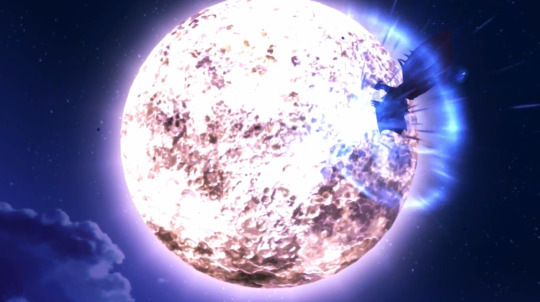
There is this one story, the tale of extermination of Nue (鵺)—a Japanese mythical creature with a monkey’s head, tanuki’s body, tiger’s limbs, and a snake tail—in “Heike Monogatari” (平家物語) where the Emperor was afflicted with an illness, but when Minamoto no Yoshiie (源義家) plucked the bowstring three times, the evil spirit was dispelled and the Emperor was restored to health. However, the source of the disease itself was not dead and continued to threaten the Emperor. Minamoto no Yorimasa (源頼政), then, climbed to the rooftop of the Imperial Palace at night and shot an arrow, and in just that one shot, slaying the source of the disease, a monster called Nue, with Yumiharidzuki (弓張月, representing the bow or the Moon, the crescent moon that looks like a bow).
And thus, the bow and arrow is associated with purification or exorcism (祓い清め) of the mind (心) from taint (穢れ), malice (邪気), evil (魔), and disaster (厄), as seen in a lot of metaphors in Japanese. The pure-hearted is said to be able to immediately hit the bull in one hit. The arrow of the noble is destined to strike the enemy and hunt the beast of fables.
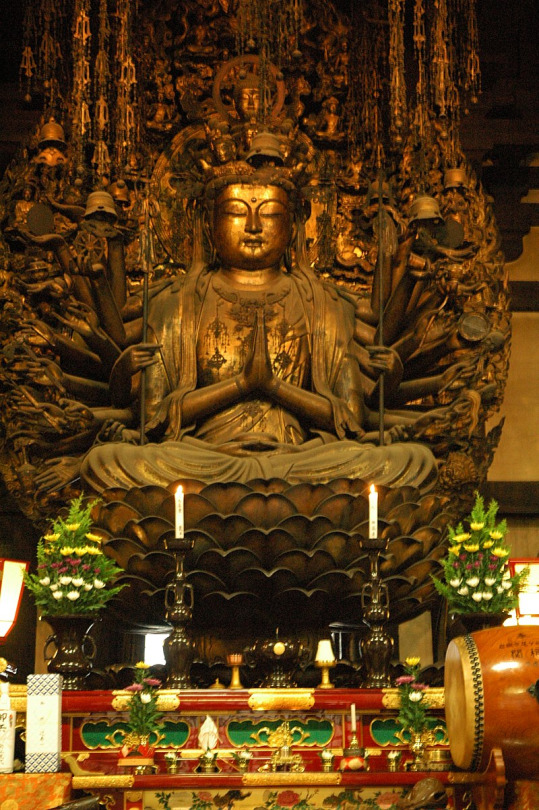
Now we turn to Buddhism. Senju Kannon (千手観音) or Senju-Sengen Kanzeon Bosatsu (千手千眼観世音菩薩), the bodhisattva of compassion and mercy, is perhaps the most widely worshipped bodhisattva in Japan. Senju-Sengen (千手千眼) literally means Thousand Arms and Thousand Eyes, originating from the fact that she has one eye in each palm of a thousand arms. These thousand arms and thousand eyes represent Kannon’s vastness of mercy and the abundance of means to save, as endeavors to relieve every living thing. In her many hands, she holds many objects, and each of these objects varies in meaning.
Two of them are houkyuu (宝弓) and houzen (宝箭), a bow and an arrow, respectively. Houkyuu stands for “increasing the honor” (“栄官を増す”), but more relevant is the meaning of houzen, which is “chance meeting with good friends” (“良き友に巡り会う”). A poetic way of saying reconnecting with true friends.


The final version of Aqua Limit, Aqua Limit: Ultima, is actually called アクアリムス・リユニオン, or Aqua Limit: Reunion, in Japanese. This indeed foreshadows their reunion in the epilogue, that they will meet again, and it is by chance (through a connection that ties them, that cannot be seen, yet can be felt, or it is precisely because it’s not seen that it can be felt stronger). Neither knew how long it would take, perhaps it would take centuries, but they could finally get there, reuniting with each other, in the end. Reunion of true friends. Mikleo, the bullet, the whistling arrow, is that connection with true friends that will never fade way, even as he is shot to the risk of his death in the final battle, and after this, Sorey will go to sleep to purify Maotelus for who knows how long. Eons, perhaps.
(Mikleo himself doesn’t consider himself as Sorey’s true friend, since he thinks that as a seraph, he can’t perceive the world the same way as Sorey does. It’s why he invited Rose to join the party. But true friends complement each other, just like how Sorey and Rose have different approaches [sees in different ways], Sorey and Mikleo complement each other through their differences.)
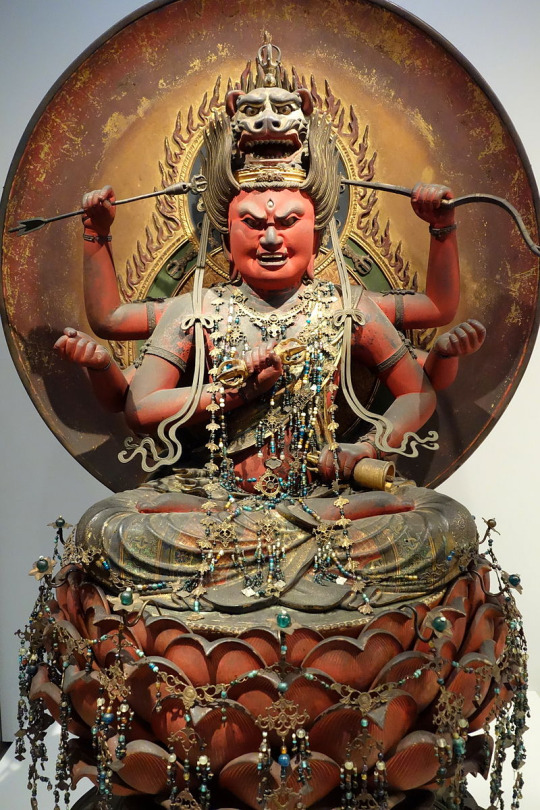
In Buddhism (especially Shingon Buddhism), there is a deity that is often associated with bow and arrow, Aizen Myouou (愛染明王). He has a very distinctive appearance, wearing a shishi (獅子, magical lion)’s crown on his head and sitting on a lotus flower. Sometimes, he is depicted with two heads: of his own and of Fudou Myouou (不動明王, and I believe I’ve talked about Sorey being a Fudou Myouou figure here), symbolizing a commingling of subjugated, complementary energies, and in Japan, they are both enshrined together, Fudou Myouou and Aizen Myouou on the left and right of Dainichi Nyorai (大日如来, I talked about him and his symbolism more in the context of Zestiria here) as the principal object of worship. In Nichiren Buddhism, in the Great Mandala Gohonzon, Fudou Myouou’s bīja “हां” is placed on the right and Aizen Myouou’s bija “हूं” is placed on the left (more on Sorey and Mikleo and Right and Left here and here and here, also while we’re at this, the Left, when paired with the Right, has significance in Shinto here, so there are many layers of meanings to this).

Aizen Myouou is known for transforming worldly desires (kleshas) into spiritual awakening, as seen from his name literally meaning “Love-Stained Wisdom King.” In Nichiren Buddhism, it is said that if Fudou Myouou embodies “life and death (saṃsāra) are precisely nirvana” (生死即涅槃, shouji-soku-nehan), then Aizen Myouou embodies “worldly desires (kleshas) are precisely enlightenment (bodhi)” (煩悩即菩提, bonnou-soku-bodai), which are the two tenets of hongaku (本覚, the innate or original enlightenment). This is because Aizen Myouou doesn’t deny love, and he is indeed known as the Buddha in charge of love, marriage, family harmony; of relationships and connections in general. His name, Aizen (愛染), can also be interpreted as the color(s) aizen (藍染).
I say uniquely Japanese, because the colors are indeed called Japanese blue; depending on how many dips, the shade changes--not just in value but also hue. The lighter it is, the closer it is to blue-green hue. The deeper it is, the closer it is to indigo blue hue.
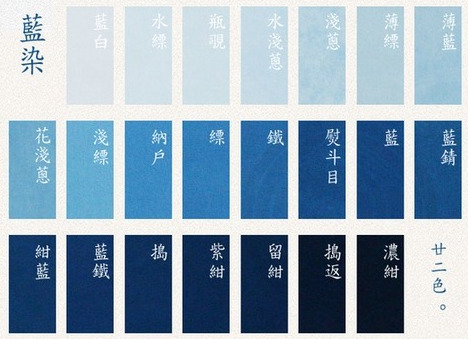
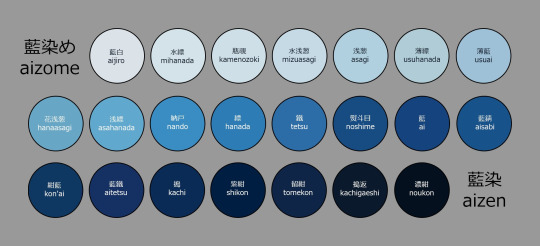
(I also must say that the lighter green-ish blue shade is called 水色 too. Literally the color of water. Commonly translated as aquamarine.)

Like the traditional Japanese blue shades, Sorey's blue is more on the deep indigo blue side in its hue and Mikleo's blue is more on the light aqua blue. Meanwhile, Water Armatus (the two of them) is the "balanced" blue in the middle.

(I have an entire Twitter thread too for this too here)
Finally, I want to talk about a certain saying that also originates from Nichiren Buddhism:

やのはしる事は弓のちから、くものゆくことは・りうのちから、をとこのしわざは・めのちからなり。
The original writing is rather hard to read because it’s written almost entirely in hiragana, but it can be transliterated as follows:
矢の走る事は弓の力、雲の行く事は竜の力、男の仕業は婦の力なり。
Which can be translated to:
It is the power of the bow that determines the flight of the arrow, the might of the dragon that controls the movement of the clouds, and the strength of the wife that guides the actions of a man.
(Remember, again, that Mikleo is connected to dragons/竜, that he is based on Azure Dragon/清龍, and clouds are connected to rain/water and thunder/lightning, two elements associated with Mikleo and Sorey respectively.)
This is from the letter of Nichiren Daishounin (日蓮大聖人). I hope the meaning is obvious enough even without my explanation.
The bow and arrow work in tandem. Without the bow, the arrow cannot work. Without the arrow, the bow cannot work either. It is in the relationship, that even a relationship between a husband and a wife is likened to this.

The same dialogue from the first Water Armatus battle above is repeated again in this scene:


MIKLEO: Sorey, I’ll do the aiming.
SOREY: Right. And I’ll pick when to fire.
Despite the Armatization being literally a process of becoming one, of two different physical bodies becoming one, interestingly the human and seraph still retain each of their own consciousness. They don’t blend into one, and the workings of this can be seen in Sorey and Mikleo coordinating to handle the timing and aiming, respectively, when in Water Armatus. Armatus does work in mysterious ways, and it perhaps cannot be described in feelings known to common humans.
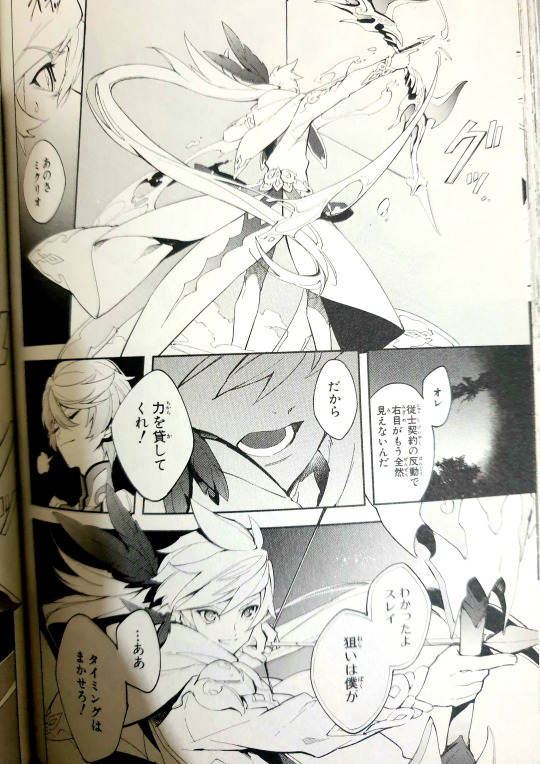
SOREY: By the way, Mikleo.
SOREY: Because of the Squire pact, I can’t see out of my right eye anymore.
SOREY: So...
SOREY: Lend me your power!
MIKLEO: Got it, Sorey. I’ll do the aiming.
SOREY: Right. And I’ll pick when to fire!
The manga outright makes Mikleo act as Sorey’s eye when aiming at the target, while Sorey handles the timing because of this. This communion, tacit understanding is a major part of their bond, after all, even without the Armatization. The novel also makes it a point that Mikleo offers to do the aiming because he has realized for a long time already that Sorey is blind on his right eye.
異体同心
種族は違うが、同じ想いを抱いて育った。人と天族の可能性を示す。
One Heart in Different Bodies
They are of different kinds, but they grew up embracing the same feelings. Showing the possibilities of humans and seraphim.
Exactly because they’re different that they can understand each other, can complement each other, as has been said before. I’ve talked about how Mikleo had needed to learn this, shortly, when I said he didn’t consider himself Sorey’s true friend, but even Sorey needed to learn about this.
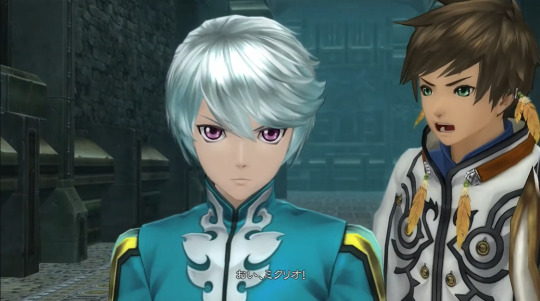
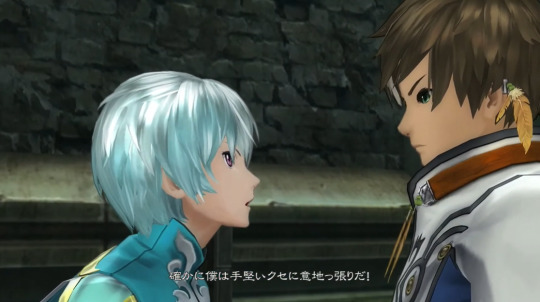



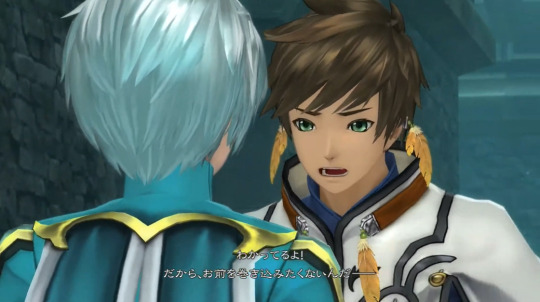
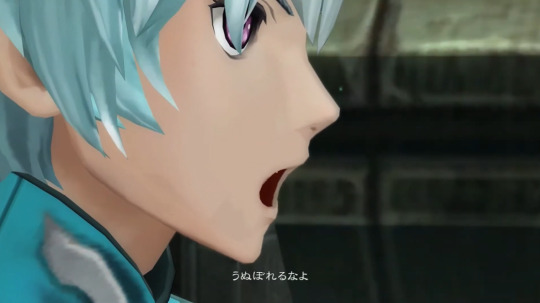

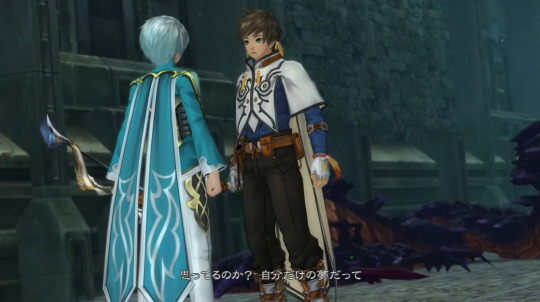



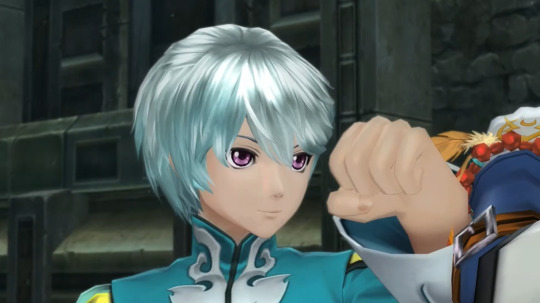
SOREY: Wait, hold on now!
MIKLEO: You’re right, I am stubborn as a rock!
SOREY: Huh?
MIKLEO: I admit it. I’m hell-bent on becoming a Sub Lord.
MIKLEO: But there’s something important that you don’t understand!
SOREY: I do understand! I just didn’t want you to get involved!
MIKLEO: Get over yourself.
SOREY: !
MIKLEO: Do you really think this is your dream alone?
SOREY: This is our dream.
Sorey’s flaw in the beginning is that he tends to carry everything by himself, that he doesn’t want the people he cares about to be hurt because of him (or what he thinks as his own responsibility, and not anyone else’s). He was alright with sharing happiness, but afraid to share anything else, even though it was implied that Michael failed as a Shepherd because he carried that burden alone. Even when Sorey and Mikleo fought (because they cared too much about each other), this had already had an effect on Sorey: he didn’t feel the excitement of exploring ruins, he couldn’t see the Earthen Historia, he wasn’t able to de-Armatize at will; and it was only when he accepted Mikleo’s offer to help him, that he could do all these and more (like how Alisha was finally able to hear the seraphim’s voices.)

MIKLEO: I know because it’s you; you were thinking that you didn’t want me to be involved, or that you didn’t want me to carry the burden.
MIKLEO: But it’s too late for all that.
MIKLEO: Our journey began a long time ago already.
MIKLEO: It’s not just your dream.
SOREY: ...Yeah.
SOREY: This is our dream!
A relationship is balanced if it’s two-way. Their bond is meant to show the limitless possibilities of how a human and seraph can work together to reach their dream together, the dream of coexistence, of being together. To be together is to share not just happiness but also sadness. It’s because life is not lived just by yourself alone, but also with others.
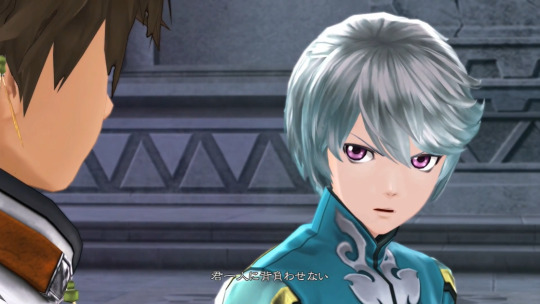
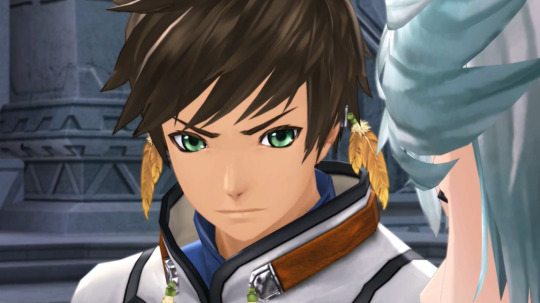
I won’t let you carry this by yourself.
Even until the very end. Just like the power of the bow determines the flight of the arrow, the arrow that flies straight and steadfast without any hesitation for its resolve, warding off anything that is evil, purifying the heart from taint, calling for friendly divinities to aid them. It will reunite them, the true friends, no matter the odds, just bet on that one chance. And this love is not to be denied.
You’ve matured through the course of this journey, and I’m proud of you for that, but don’t forget, I’m also here, right next to you, and I won’t let you carry everything by yourself.
唯一無二の
互いに誰よりも負けたくない相手。だから成長できる。今までも、これからも。
The One and Only
They do not want to lose to each other more than anyone else. That’s why they can grow. Until now, and from now on.
Mikleo is the best support Sorey could’ve gotten, even if he didn’t ask for him himself.
May these bow and arrow represent happiness and blessings, just as they used to in the ancient times long past.
弓を構えて真実射抜け
Pull the bow and aim for the truth.
#tales of#tales of zestiria#mino talks zesty#mino rambles#yet another#srmk lovemail#their divine bow is also the most beautiful divine artifact btw at least imo lol#sorey really needed to unlearn his meebogynist views lol#i am now emotional again over all the water armatus moments in the game#i did this to myself and now you all have to experience it too with me
35 notes
·
View notes
Text
Unused dialogue that plays after Mikleo uses his artes to make the bridge visible, but before they actually cross it. There is no English voice acting, but the subtitles were translated.
Unused in-game text:
Mikleo: I'll go first.
Sorey: All right.
ミクリオ「まずは僕が先に行こう」
スレイ「うん。わかった」
8 notes
·
View notes
Text
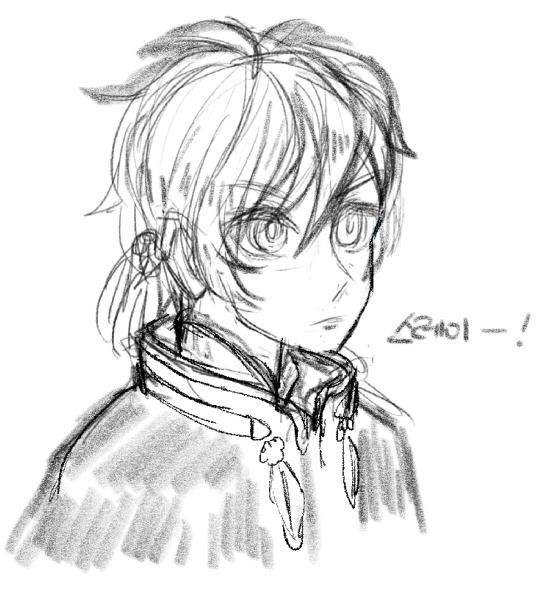
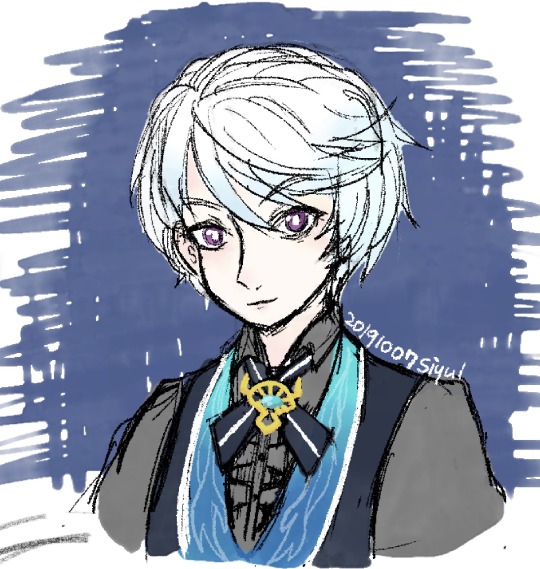
Tales of zestiria
sorey , mikleo
#tales of zestiria#tales#tales of#zestiria#toz#테일즈 오브 제스티리아#제스티리아#テイルズ オブ ゼスティリア#テイルズ オブ#テイルズ#ぜスチィリア#sorey#mikleo#スレイ#ミクリオ#스레이#미쿠리오
59 notes
·
View notes
Text
AM3時半までずっと考えてたスレイさんについての話。クソ長い。
やはりゼスティリアは単品では輝けず、ベルセリアありきの存在だと思った。
ベルセリアから続けてゼスティリアをやり直してスレイさんを咀嚼できるかと思ったら出来なかった
そもそも彼はプレイヤーに咀嚼の余地を与えない存在だった。最初からそう仕組まれた存在だった。
改めてじっくりゼスティリアをやり直して浮かんできたスレイというキャラクターの感想は『まるでNPCだ』
彼は良くも悪くも『傍観者』だったと思う。テイルズオブゼスティリアという物語における主人公であり、傍観者だった。
スレイとは、『主人公』である立場を通じて『プレイヤー』をこの物語に繋げる存在だった。『プレイヤー』は『主人公』を通してこの物語を見届け「させられた」のだと思った。
ここら辺が『ラジコン』と揶揄される所以なんだと思う。
純真故に周りに言われるままに行動し、それが自分が導いた答えだと錯覚している。それが導師だからと言い聞かせて。
似たような存在にエクシリア2のルドガーがいるけど、ルドガーとスレイの決定的な違いはプレイヤーに選択権がないこと、だと思う。だからNPC。ノンプレイアブルキャラクター。
プレイヤーに選択権はなく、世界は目まぐるしく変動し穢れ、浄化され、衝突し、和平した。
スレイさんの情熱はあたかも自分で燃やしているかのように見え、その実 世界に火をくべられ燃やされていたのだと思う。
メタフィクション的な視点だとこうなってしまうけど、同時にスレイという1人の人間としては実は最初から最後までブレていないと、ヘルダルフを殺すという結論のエンディングを迎えて改めて思えた。
スレイは穢れを生まない人間だった。導師の力を恐れられても、救済に感謝をされなくても、ヘルダルフやサイモンにどんな嫌がらせをされようとも穢れなかった。
それは自分の言動に対してあまりにも真っ直ぐだったから。何かの影響を受けていようと受けていなかろうと、そこに気付いていないから。
育ての親であるジイジをその手で殺してしまっても穢れる事はなかった。初めて人前で慟哭しても、地面に膝も手もついてボタボタと涙を流しても、穢れを発さなかった。ジイジを殺した事実に対してすら負の感情を抱かなかった。それが結局自分の道に必要なものだと、自分の答えだと真っ直ぐに受け入れたから。
受け入れたから、「救いたい」と思ったヘルダルフを殺した。ジイジにとって、ヘルダルフにとって、死が救済だという結論に至った。
(ミクリオはロゼを止めてしまうほどギリギリまで足掻き、覚悟出来なかった。もしミクリオが人間だったら一発で穢れていたと思う。ここがスレイとミクリオの大きな違い)
そしてその結論は、ある意味では自分の死(孤独)である『大地を浄化しきるまで眠りにつく』という選択を躊躇いもなくさせた。
それは感情があるようで、実は感情を殺している……というよりは情を感じないように心を鈍くしているのではないかと思う。
水を吸い込むスポンジではなく、水をすり抜けるザル。
まるで初代導師アルトリウスが願った世界『感情がなくなり、穢れを生まない世界』の人間のように。
皮肉にもスレイはアルトリウスがそうであり、願ったような、ベルベットが否定した理の体現(いつの世も導師と災禍の顕主は対立する宿命にあるとヘルダルフも認めている)なんだと思った。
だから彼は傍観者であり、きっちりとメーヴィンを受け継いだ刻遺の語り部(看取る者)になった。
だからこそスレイの後を受け継いだのはロゼだった。同じくいい意味で心が鈍く(自覚あり)、穢れを生まない存在だから。
アリーシャは心が豊かすぎた。たまにそぞろ涙目だけど、他人の幸せと夢を願い、笑顔がとびきり似合うアリーシャには導師になることはできないし、刻遺の語り部にもなれなかった。
ひとには孤独はつらいと諭しておきながら、自分は孤独を前向きに選ぶなんともまぁ自分勝手な(真っ直ぐな)人間である。これで穢れないから導師をやれているし、これで自分で制御出来ないほどの穢れを生むベルベットはやはり災禍の顕主だった。
初期のベルベットは自分の復讐に真っ直ぐにひたむきであった結果余剰分の穢れを発する事はなく、その復讐が汚い言い方ではエゴであると気付いた時から穢れを抑えられなくなった。(だからこそ自分は自分であると前向きに受け止めて、前向きに災禍の顕主となった)
災禍の顕主とは、下手したら心がとても豊かであればあるほど、ひとを想う気持ちがあればあるほどなってしまう存在なのかもしれない。(ヘルダルフは先代導師ミケルに無理やり呪われたんだけど)
ここで言っておきたいけど、本来のスレイはとても心が豊かな人間だと思う。ゴブリンシューター類に出会った時の反応や意匠察知の反応から察するに、見るもの全てに心を踊らせ好奇心の赴くまま行動するし、思ったことをそのまま言葉で伝えている。一個人としては年相応の少年であったけど、そこに導師の使命、宿命が降り掛かってしまった。
ライラは使命に囚われないで欲しいと願ったけれど、結果それがスレイを『導師に囚われない導師であらねばならない』という一種の呪いにかけたのかもしれない。
結局は導師の道を選んでしまった以上、その先にあるのは『世界の呪いが生んだ導師』として生きるという称号であり呪縛だったかもしれない。
(もしかしたらこれは導師に仕えるが故のライラの加護の結果なのかもしれないけどその真相は分からないし別の話)
それはつまり、スレイ自身もたどり着いた答えである『誰も正しくない』だった。本人が気付いてるかはわからないけど、スレイもまた『正しくない世界の中の1人』となっていた。導師を受けいれた以上は。
でも受け入れたのは、ひとえにスレイが純真で真っ直ぐだったからに他ならない。彼は受け入れるべくして受け入れた。
主人公としての、世界が強制してくるシステム的なスレイさんと、1人の人間としてのスレイの齟齬がゼスティリアの評価できない部分に繋がるんだと思った。だからゼスティリアというゲームは初心者に薦められないけれど、スレイはとてもいい人間だと思う。
結論、スレイさんを咀嚼する事は出来なかった。彼は噛み砕くにはあまりにも真っ直ぐで堅く、丸呑みするしかなかった。
ゼスクロではこの辺の折り合いがうまくつけられて人間味が溢れている(ゲームよりも自分の意志を伝えるようになっている。アリーシャに自分から名前を聞いたりとか)ので、飲み込みやすくなっているんだなあ。
そもそもスレイさんはこの世界での短い旅路では、この結論に至るしかなかった。
穢れシステムが歪んでいるのは天界の天族が『聖隷』と人間に施した呪いのせいだから、スレイさんを責めるのはお門違い。
穢れを生む人間に当てられドラゴン化する聖隷もとい天族と、ドラゴンに怯え穢れを生む人間。
これが実は天界の天族の呪いのせいだったと語る時間もモノもヒトもなかった旅路では、���付けと言うのが無理な話。
真に呪いを解く日は、遠い未来スレイとミクリオの旅路の中で見つかれば御の字というか、2人ならきっと天への階梯を見つけてしまうと思う。
その時にはバチバチにキレ散らかして、怒り狂っても穢れが出ない世界を取り戻して欲しいし、きっとベルベットも一緒にいてほしい。
0 notes
